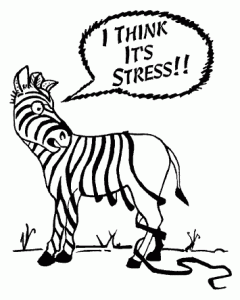Stress management can be complicated and confusing because there are different types of stress–acute stress, episodic acute stress, and chronic stress — each with its own characteristics, symptoms, duration, and treatment approaches.
{The good news is that massage therapy can help facilitate stress management!}
Acute Stress
Acute stress is the most common form of stress. It comes from demands and pressures of the recent past and anticipated demands and pressures of the near future. Acute stress is thrilling and exciting in small doses, but too much is exhausting. A fast run down a challenging ski slope, for example, is exhilarating early in the day. That same ski run late in the day is taxing and wearing. Skiing beyond your limits can lead to falls and broken bones. By the same token, overdoing on short-term stress can lead to psychological distress, tension headaches, upset stomach, and other symptoms.
Fortunately, acute stress symptoms are recognized by most people. It’s a laundry list of what has gone awry in their lives: the auto accident that crumpled the car fender, the loss of an important contract, a deadline they’re rushing to meet, their child’s occasional problems at school, and so on.
Because it is short term, acute stress doesn’t have enough time to do the extensive damage associated with long-term stress. The most common symptoms are:
- emotional distress–some combination of anger or irritability, anxiety, and depression, the three stress emotions;
- muscular problems including tension headache, back pain, jaw pain, and the muscular tensions that lead to pulled muscles and tendon and ligament problems;
- stomach, gut and bowel problems such as heartburn, acid stomach, flatulence, diarrhea, constipation, and irritable bowel syndrome;
- transient over arousal leads to elevation in blood pressure, rapid heartbeat, sweaty palms, heart palpitations, dizziness, migraine headaches, cold hands or feet, shortness of breath, and chest pain.
Acute stress can crop up in anyone’s life, and it is highly treatable and manageable.
Episodic Acute Stress
There are those, however, who suffer acute stress frequently, whose lives are so disordered that they are studies in chaos and crisis. They’re always in a rush, but always late. If something can go wrong, it does. They take on too much, have too many irons in the fire, and can’t organize the slew of self-inflicted demands and pressures clamoring for their attention. They seem perpetually in the clutches of acute stress.
It is common for people with acute stress reactions to be over aroused, short-tempered, irritable, anxious, and tense. Often, they describe themselves as having “a lot of nervous energy.” Always in a hurry, they tend to be abrupt, and sometimes their irritability comes across as hostility. Interpersonal relationships deteriorate rapidly when others respond with real hostility. The work becomes a very stressful place for them.
The cardiac prone, “Type A” personality described by cardiologists, Meter Friedman and Ray Rosenman, is similar to an extreme case of episodic acute stress. Type A’s have an “excessive competitive drive, aggressiveness, impatience, and a harrying sense of time urgency.” In addition there is a “free-floating, but well-rationalized form of hostility, and almost always a deep-seated insecurity.” Such personality characteristics would seem to create frequent episodes of acute stress for the Type A individual. Friedman and Rosenman found Type A’s to be much more likely to develop coronary heat disease than Type B’s, who show an opposite pattern of behavior.
Another form of episodic acute stress comes from ceaseless worry. “Worry warts” see disaster around every corner and pessimistically forecast catastrophe in every situation. The world is a dangerous, unrewarding, punitive place where something awful is always about to happen. These “awfulizers” also tend to be over aroused and tense, but are more anxious and depressed than angry and hostile.
The symptoms of episodic acute stress are the symptoms of extended over arousal: persistent tension headaches, migraines, hypertension, chest pain, and heart disease. Treating episodic acute stress requires intervention on a number of levels, generally requiring professional help, which may take many months.
Often, lifestyle and personality issues are so ingrained and habitual with these individuals that they see nothing wrong with the way they conduct their lives. They blame their woes on other people and external events. Frequently, they see their lifestyle, their patterns of interacting with others, and their ways of perceiving the world as part and parcel of who and what they are.
Sufferers can be fiercely resistant to change. Only the promise of relief from pain and discomfort of their symptoms can keep them in treatment and on track in their recovery program.
Chronic Stress
While acute stress can be thrilling and exciting, chronic stress is not. This is the grinding stress that wears people away day after day, year after year. Chronic stress destroys bodies, minds and lives. It wreaks havoc through long-term attrition. It’s the stress of poverty, of dysfunctional families, of being trapped in an unhappy marriage or in a despised job or career. It’s the stress that the never-ending “troubles” have brought to the people of Northern Ireland, the tensions of the Middle East have brought to the Arab and Jew, and the endless ethnic rivalries that have been brought to the people of Eastern Europe and the former Soviet Union.
Chronic stress comes when a person never sees a way out of a miserable situation. It’s the stress of unrelenting demands and pressures for seemingly interminable periods of time. With no hope, the individual gives up searching for solutions.
Some chronic stresses stem from traumatic, early childhood experiences that become internalized and remain forever painful and present. Some experiences profoundly affect personality. A view of the world, or a belief system, is created that causes unending stress for the individual (e.g., the world is a threatening place, people will find out you are a pretender, you must be perfect at all times). When personality or deep-seated convictions and beliefs must be reformulated, recovery requires active self-examination, often with professional help.
The worst aspect of chronic stress is that people get used to it. They forget it’s there. People are immediately aware of acute stress because it is new; they ignore chronic stress because it is old, familiar, and sometimes, almost comfortable.
Chronic stress kills through suicide, violence, heart attack, stroke, and, perhaps, even cancer. People wear down to a final, fatal breakdown. Because physical and mental resources are depleted through long-term attrition, the symptoms of chronic stress are difficult to treat and may require extended medical as well as behavioral treatment and stress management.
Adapted from The Stress Solution by Lyle H. Miller, Ph.D., and Alma Dell Smith, Ph.D.
American Psychological Association
 Before, during or even after a sporting event, stress can affect you in many ways which will determine the outcome of your performance. The need for athletes to be focused in training and competition is of utmost importance. Under the negative effects of stress, psychological tension may develop and distract you from staying focused. This, in turn adversely affects your performance.
Before, during or even after a sporting event, stress can affect you in many ways which will determine the outcome of your performance. The need for athletes to be focused in training and competition is of utmost importance. Under the negative effects of stress, psychological tension may develop and distract you from staying focused. This, in turn adversely affects your performance. Stress is a fact of life and a necessity in many cases but left unaddressed, stress can wreak havoc on your body systems and interfere with the intelligent workings of your body. Simply put, general health will be impaired and ill effects unavoidable.
Stress is a fact of life and a necessity in many cases but left unaddressed, stress can wreak havoc on your body systems and interfere with the intelligent workings of your body. Simply put, general health will be impaired and ill effects unavoidable.